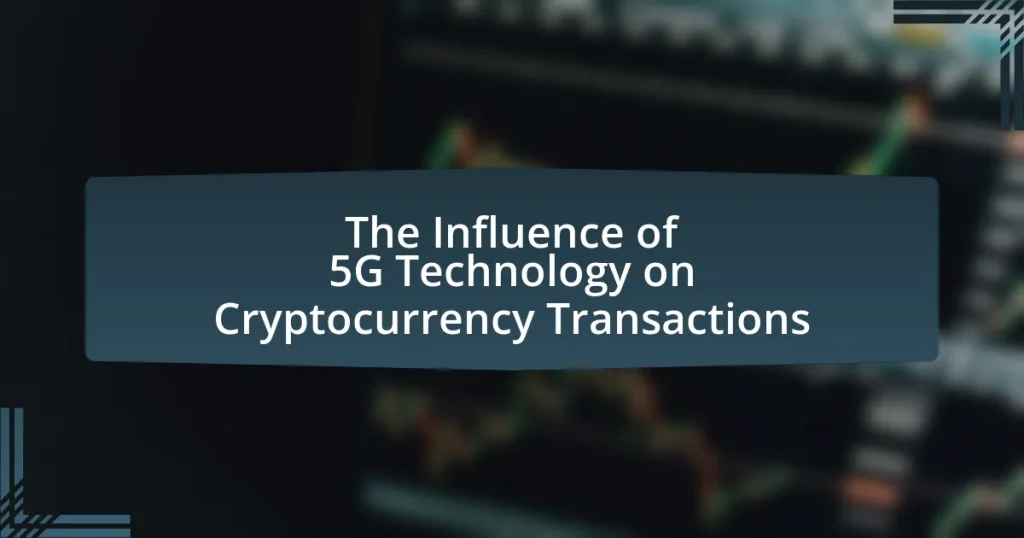5G technology significantly impacts cryptocurrency transactions by enhancing data transfer speeds, reducing latency, and improving network reliability. These advancements facilitate quicker transaction confirmations and a more efficient user experience, essential for high-frequency trading and real-time applications in the cryptocurrency market. The article explores how 5G enhances transaction speeds, addresses security concerns, and discusses the implications for blockchain scalability and decentralized finance (DeFi). Additionally, it highlights the economic effects of 5G on cryptocurrency markets, including potential changes in transaction fees and investment opportunities, while also outlining best practices for users to ensure secure and optimized trading experiences.

What is the Influence of 5G Technology on Cryptocurrency Transactions?
5G technology significantly enhances cryptocurrency transactions by providing faster data transfer speeds, lower latency, and improved network reliability. These advancements enable quicker transaction confirmations and a more seamless user experience, which is crucial for trading and real-time applications in the cryptocurrency market. For instance, 5G networks can reduce transaction times from several minutes to mere seconds, facilitating high-frequency trading and increasing the overall efficiency of blockchain operations. Additionally, the increased bandwidth allows for more devices to connect simultaneously, supporting the growing number of users and applications in the cryptocurrency ecosystem.
How does 5G technology enhance cryptocurrency transaction speeds?
5G technology enhances cryptocurrency transaction speeds by providing significantly lower latency and higher bandwidth compared to previous generations of mobile networks. The reduced latency, often as low as 1 millisecond, allows for near-instantaneous communication between devices and blockchain networks, facilitating quicker transaction confirmations. Additionally, the increased bandwidth supports a higher volume of transactions being processed simultaneously, which is crucial for scaling cryptocurrency networks. For instance, 5G can handle up to 1 million devices per square kilometer, enabling more users to engage in transactions without congestion. This combination of low latency and high capacity directly contributes to faster and more efficient cryptocurrency transactions.
What are the technical improvements in 5G that facilitate faster transactions?
The technical improvements in 5G that facilitate faster transactions include enhanced data transfer speeds, reduced latency, and increased network capacity. 5G technology can achieve download speeds of up to 10 Gbps, which is significantly faster than 4G, allowing for quicker data exchanges essential for cryptocurrency transactions. Additionally, 5G reduces latency to as low as 1 millisecond, enabling near-instantaneous communication between devices, which is critical for real-time transaction processing. Furthermore, the increased capacity of 5G networks supports a higher number of simultaneous connections, accommodating the growing demand for digital transactions without congestion. These advancements collectively enhance the efficiency and speed of cryptocurrency transactions.
How does reduced latency in 5G impact transaction confirmation times?
Reduced latency in 5G significantly decreases transaction confirmation times. This improvement occurs because 5G networks can achieve latency as low as 1 millisecond, compared to 4G’s average latency of around 30-50 milliseconds. The rapid data transmission allows for quicker communication between nodes in a blockchain network, facilitating faster validation and confirmation of transactions. Consequently, this reduction in latency enhances the overall efficiency of cryptocurrency transactions, making them more viable for real-time applications.
What challenges does 5G technology present for cryptocurrency transactions?
5G technology presents several challenges for cryptocurrency transactions, primarily related to security vulnerabilities and increased transaction speeds. The enhanced speed and connectivity of 5G can lead to a higher risk of cyberattacks, as malicious actors may exploit the faster networks to execute attacks such as Distributed Denial of Service (DDoS) or man-in-the-middle attacks. Additionally, the rapid transaction speeds may outpace the current security protocols in place, potentially leading to errors or fraud in transaction verification. According to a report by the International Telecommunication Union, the increased connectivity of 5G networks can also lead to greater exposure of devices to threats, complicating the security landscape for cryptocurrency users.
What security concerns arise with the implementation of 5G in cryptocurrency?
The implementation of 5G in cryptocurrency raises significant security concerns, primarily due to increased vulnerability to cyberattacks. The higher data transmission speeds and connectivity of 5G networks can facilitate more sophisticated attacks, such as Distributed Denial of Service (DDoS) attacks, which can overwhelm cryptocurrency exchanges and wallets. Additionally, the proliferation of Internet of Things (IoT) devices connected through 5G can create more entry points for hackers, increasing the risk of unauthorized access to sensitive financial data. Research indicates that the rapid expansion of 5G networks may outpace the development of adequate security protocols, leaving systems exposed to exploitation.
How does network congestion affect cryptocurrency transactions over 5G?
Network congestion negatively impacts cryptocurrency transactions over 5G by increasing latency and reducing transaction speeds. When the network is congested, the time it takes for data packets to travel from one point to another increases, leading to delays in transaction confirmations. This can result in slower processing times for cryptocurrency transactions, which are typically designed to be completed quickly. For instance, during peak usage times, the average latency for 5G networks can rise significantly, potentially exceeding 20 milliseconds, which can hinder the efficiency of real-time transactions. Additionally, congestion can lead to packet loss, further complicating the transaction process and increasing the likelihood of failed transactions.
What potential does 5G technology unlock for cryptocurrency adoption?
5G technology significantly enhances cryptocurrency adoption by providing faster transaction speeds, lower latency, and improved connectivity. These advancements enable real-time processing of transactions, which is crucial for the scalability of cryptocurrencies. For instance, 5G networks can support thousands of devices simultaneously, allowing for a higher volume of transactions without congestion. This capability is essential for decentralized finance (DeFi) applications and smart contracts, which require quick and reliable interactions. Additionally, the increased bandwidth of 5G facilitates the use of advanced technologies such as the Internet of Things (IoT), which can integrate with blockchain systems to create more efficient and automated financial ecosystems.
How can 5G improve user experience in cryptocurrency trading platforms?
5G can significantly enhance user experience in cryptocurrency trading platforms by providing faster data transmission speeds and lower latency. This improved connectivity allows for real-time trading, enabling users to execute transactions almost instantaneously, which is crucial in the volatile cryptocurrency market. For instance, 5G networks can achieve speeds up to 10 Gbps, compared to 4G’s maximum of 1 Gbps, facilitating quicker access to market data and trading functionalities. Additionally, the reduced latency of 5G, which can be as low as 1 millisecond, minimizes delays in order execution, thereby increasing the efficiency and reliability of trades. This combination of speed and responsiveness directly contributes to a more seamless and effective trading experience for users.
What role does 5G play in the development of decentralized finance (DeFi)?
5G plays a crucial role in the development of decentralized finance (DeFi) by enabling faster transaction speeds and lower latency, which are essential for real-time trading and financial services. The enhanced bandwidth of 5G allows for more data to be processed simultaneously, facilitating complex smart contracts and decentralized applications (dApps) that require quick data exchanges. Additionally, 5G’s ability to connect a larger number of devices seamlessly supports the growing ecosystem of IoT devices that can interact with DeFi platforms, thereby expanding their functionality and user base. This technological advancement is expected to drive increased adoption and innovation within the DeFi space, as evidenced by the rapid growth of blockchain networks and applications that leverage 5G capabilities.

How does 5G technology interact with blockchain networks?
5G technology enhances blockchain networks by providing faster data transmission, lower latency, and increased connectivity, which are essential for real-time transactions and smart contract execution. The high-speed capabilities of 5G enable blockchain applications to process large volumes of transactions simultaneously, improving scalability and efficiency. For instance, 5G can support the Internet of Things (IoT) devices that interact with blockchain, facilitating seamless data sharing and automation in decentralized applications. This interaction is crucial for sectors like supply chain management and finance, where timely data is vital for decision-making and operational efficiency.
What are the implications of 5G on blockchain scalability?
5G technology significantly enhances blockchain scalability by providing faster data transmission and lower latency. This increased speed allows for quicker transaction processing and validation, which is crucial for blockchain networks that require high throughput to accommodate a growing number of users and transactions. For instance, 5G can support data rates exceeding 10 Gbps, compared to 4G’s maximum of around 1 Gbps, enabling blockchain systems to handle more transactions per second. Additionally, the reduced latency of 5G, often below 1 millisecond, facilitates real-time interactions and smart contract executions, further improving the efficiency of decentralized applications. These advancements can lead to a more robust and scalable blockchain ecosystem, capable of supporting a wider range of applications and services.
How does increased bandwidth from 5G affect blockchain data processing?
Increased bandwidth from 5G significantly enhances blockchain data processing by enabling faster transaction speeds and improved network reliability. This higher bandwidth allows for quicker data transmission, which is crucial for the real-time processing of transactions on blockchain networks. For instance, 5G can support data rates exceeding 10 Gbps, compared to 4G’s maximum of around 1 Gbps, facilitating the rapid exchange of large volumes of data necessary for blockchain operations. Consequently, this improvement can lead to reduced latency in transaction confirmations and a more efficient overall network performance, ultimately benefiting cryptocurrency transactions and applications reliant on blockchain technology.
What are the effects of 5G on the efficiency of smart contracts?
5G technology significantly enhances the efficiency of smart contracts by providing faster data transmission, reduced latency, and improved connectivity. These advancements enable real-time execution of smart contracts, allowing for quicker verification and processing of transactions. For instance, 5G’s low latency, which can be as low as 1 millisecond compared to 4G’s 30-50 milliseconds, facilitates immediate responses to contract conditions, thereby increasing the overall throughput of blockchain networks. Additionally, the higher bandwidth of 5G supports more devices and transactions simultaneously, which is crucial for decentralized applications that rely on smart contracts. This combination of speed and capacity leads to a more efficient and scalable implementation of smart contracts in various sectors, including finance and supply chain management.
How does 5G technology influence the security of cryptocurrency transactions?
5G technology enhances the security of cryptocurrency transactions by providing faster data transmission and lower latency, which facilitates real-time monitoring and quicker response to potential threats. The increased bandwidth allows for more robust encryption methods and improved security protocols, reducing the risk of data breaches and fraud. For instance, the implementation of advanced security features, such as multi-factor authentication and biometric verification, becomes more effective with the high-speed connectivity of 5G networks. This capability is crucial in protecting sensitive transaction data from cyberattacks, as evidenced by studies indicating that faster networks can significantly decrease the time window for attackers to exploit vulnerabilities.
What encryption methods are enhanced by 5G technology?
5G technology enhances several encryption methods, particularly those used in secure communication protocols like Advanced Encryption Standard (AES) and Elliptic Curve Cryptography (ECC). The increased bandwidth and lower latency of 5G facilitate faster data transmission, which allows for more complex encryption algorithms to be implemented without significant performance degradation. Additionally, 5G networks support improved security features such as network slicing and enhanced authentication mechanisms, which further bolster the effectiveness of these encryption methods in protecting sensitive data, including cryptocurrency transactions.
How does 5G impact the vulnerability of cryptocurrency networks to attacks?
5G technology increases the vulnerability of cryptocurrency networks to attacks by enabling faster data transmission and lower latency, which can facilitate more sophisticated and rapid cyberattacks. The enhanced speed of 5G allows attackers to exploit vulnerabilities in blockchain protocols and smart contracts more efficiently, potentially leading to increased instances of Distributed Denial of Service (DDoS) attacks and other malicious activities. Additionally, the proliferation of connected devices under 5G can expand the attack surface, making it easier for hackers to find and exploit weaknesses in network security.
What are the economic implications of 5G technology on cryptocurrency markets?
5G technology is expected to significantly enhance cryptocurrency markets by improving transaction speeds and network reliability. The increased bandwidth and lower latency of 5G can facilitate faster processing of cryptocurrency transactions, which is crucial for high-frequency trading and real-time applications. For instance, 5G can support a higher volume of transactions per second, potentially leading to increased market liquidity. Additionally, the enhanced connectivity may encourage broader adoption of cryptocurrencies, as users experience fewer delays and interruptions. This shift could result in a more robust market, attracting institutional investors and increasing overall market capitalization.
How does 5G technology affect transaction fees in cryptocurrency exchanges?
5G technology can potentially lower transaction fees in cryptocurrency exchanges by enabling faster data transmission and reducing latency. The increased speed and efficiency of 5G networks allow for quicker transaction confirmations and improved scalability of blockchain networks. For instance, 5G can support a higher volume of transactions per second, which can lead to lower operational costs for exchanges. As a result, these savings may be passed on to users in the form of reduced transaction fees.
What is the potential for 5G to drive new investment in cryptocurrency projects?
5G technology has significant potential to drive new investment in cryptocurrency projects by enabling faster transaction speeds and improved network reliability. The enhanced bandwidth and reduced latency of 5G can facilitate real-time transactions, making cryptocurrency more viable for everyday use and attracting investors looking for scalable solutions. According to a report by the Global System for Mobile Communications (GSMA), 5G networks are expected to support a substantial increase in connected devices, which can lead to greater adoption of blockchain technology and decentralized applications. This increased connectivity can create new opportunities for innovative cryptocurrency projects, thereby attracting investment.

What are the future trends of 5G technology in cryptocurrency transactions?
The future trends of 5G technology in cryptocurrency transactions include enhanced transaction speeds, improved security protocols, and increased accessibility. 5G networks can facilitate faster data transfer rates, enabling near-instantaneous transaction confirmations, which is crucial for high-frequency trading and real-time payments in cryptocurrency markets. Additionally, the low latency of 5G can support more complex smart contracts and decentralized applications, allowing for more sophisticated financial services. Furthermore, as 5G expands globally, it will enhance accessibility to cryptocurrency platforms in underserved regions, potentially increasing user adoption and market growth. These trends are supported by the ongoing rollout of 5G infrastructure and the growing integration of blockchain technology in various sectors, indicating a significant shift in how cryptocurrency transactions will be conducted in the future.
How might 5G technology evolve to further benefit cryptocurrency transactions?
5G technology may evolve to enhance cryptocurrency transactions by providing significantly faster data transfer speeds and lower latency, which can facilitate real-time processing of transactions. This improvement allows for quicker confirmations and reduces the likelihood of network congestion during peak usage times, thereby increasing the efficiency of blockchain networks. For instance, 5G networks can support millions of devices per square kilometer, enabling a higher volume of transactions to be processed simultaneously without delays. Additionally, the increased bandwidth can support more complex smart contracts and decentralized applications, further driving innovation in the cryptocurrency space.
What innovations in 5G could emerge that specifically target cryptocurrency use cases?
Innovations in 5G that could specifically target cryptocurrency use cases include enhanced network speed, reduced latency, and improved connectivity for decentralized applications. These advancements enable faster transaction processing, allowing for real-time cryptocurrency exchanges and microtransactions, which are essential for applications like IoT payments. For instance, 5G’s capability to support a massive number of connected devices simultaneously can facilitate the integration of blockchain technology in various sectors, enhancing security and transparency in transactions. Additionally, the increased bandwidth can support more complex smart contracts and decentralized finance (DeFi) applications, making them more accessible and efficient.
How can cryptocurrency platforms prepare for the advancements in 5G technology?
Cryptocurrency platforms can prepare for advancements in 5G technology by enhancing their infrastructure to support faster transaction speeds and increased data capacity. The implementation of 5G technology is expected to significantly reduce latency, allowing for near-instantaneous transaction confirmations, which is crucial for high-frequency trading and real-time payment processing. Additionally, platforms should invest in robust security measures to protect against potential vulnerabilities that may arise with increased connectivity. According to a report by the GSMA, 5G networks can support up to one million devices per square kilometer, which means cryptocurrency platforms must scale their systems to handle a larger volume of transactions and users simultaneously. This preparation will ensure that they can leverage the benefits of 5G technology effectively, maintaining competitiveness in a rapidly evolving digital landscape.
What best practices should users follow when utilizing 5G for cryptocurrency transactions?
Users should prioritize security, connectivity, and transaction management when utilizing 5G for cryptocurrency transactions. To enhance security, users must employ strong passwords, enable two-factor authentication, and utilize secure wallets to protect their assets from potential cyber threats. Connectivity is crucial; users should ensure they are connected to a reliable and secure 5G network to minimize latency and avoid interruptions during transactions. Additionally, users should monitor transaction fees and network congestion, as 5G can facilitate faster transactions but may also lead to increased costs during peak usage times. Following these best practices can significantly reduce risks and improve the efficiency of cryptocurrency transactions over 5G networks.
How can users ensure their transactions remain secure over 5G networks?
Users can ensure their transactions remain secure over 5G networks by employing strong encryption methods and utilizing secure wallets. Strong encryption protects data during transmission, making it difficult for unauthorized parties to intercept sensitive information. Additionally, using secure wallets, such as hardware wallets or reputable software wallets with two-factor authentication, adds an extra layer of security against potential breaches. According to a report by the International Telecommunication Union, encryption significantly reduces the risk of data breaches, highlighting its importance in maintaining transaction security over advanced networks like 5G.
What steps can users take to optimize their cryptocurrency trading experience on 5G?
To optimize their cryptocurrency trading experience on 5G, users should ensure they have a reliable 5G connection, utilize trading platforms that are optimized for high-speed networks, and implement security measures such as two-factor authentication. A stable 5G connection significantly reduces latency, allowing for faster transaction execution and real-time market data access. Trading platforms designed for 5G can leverage the increased bandwidth to provide enhanced features, such as advanced charting tools and quicker order processing. Additionally, employing security measures is crucial, as the speed of transactions can also attract cyber threats, making it essential to protect sensitive information.










